Attracting customers to your e-commerce website is a challenge, especially when you are up against industry giants. With paid advertising costs on the rise due to fierce competition, it is more important than ever to explore cost-effective, organic marketing strategies.
Finding alternative organic content marketing strategies can allow you to create valuable content that resonates with your audience, and you can build lasting customer relationships while driving sales.
In this blog, we will dive into the most effective e-commerce content marketing strategies that can help you stand out, boost conversions, and generate sustainable revenue. Plus, we will explore some successful marketing tactics used by top brands to inspire your own approach.
What is Content Marketing?
Content marketing involves creating and sharing valuable information aimed at target customers. It focuses on informing and educating people about a company’s offerings, ultimately driving them to purchase products or use services.
It is an essential element of Search Engine Optimisation (SEO). Without any content, there is nothing to optimize on your website. Effective e-commerce content marketing strategies enable buyers to access information at any point during their entire purchasing journey.
Benefits of Implementing Content Marketing Strategies for E-Commerce Websites
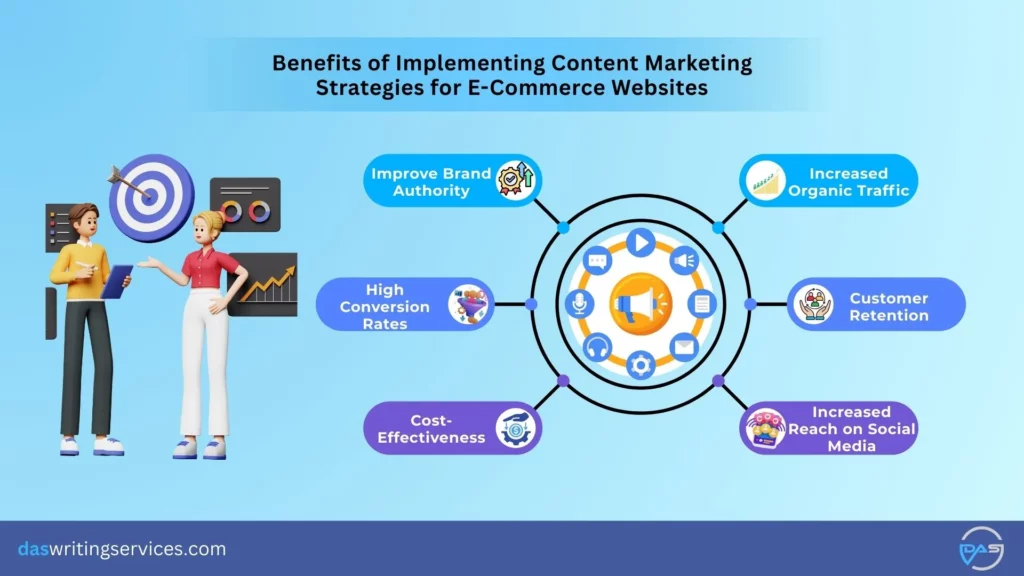
E-commerce websites must implement content marketing strategies to boost sales and generate revenue. According to Statista, e-commerce giant Amazon has spent a total of $43.9 billion, and Procter and Gamble (P&G) invested $2.88 billion in content marketing.
Below are some benefits of implementing a content marketing strategy for an e-commerce business:
- Improve Brand Authority: Creating and publishing informative content can help make your brand an expert in a particular industry.
- Increased Organic Traffic: E-commerce marketing strategy can also increase your brand’s public awareness, which can result in increased organic traffic.
- High Conversion Rates: Creative and informational content can not only attract users but also convert them into permanent customers by addressing their needs.
- Customer Retention: Creating engaging content like blogs and brands can make existing customers stay connected to the brand.
- Cost-Effectiveness: Since it involves repurposing content in various channels, content marketing is a cost-effective approach compared to traditional marketing.
- Increased Reach on Social Media: Posting shareable content may provide a better audience reach on social media platforms. This can also drive higher traffic to your e-commerce website.
9 E-Commerce Content Marketing Strategies for Growth
Content marketing can be a specialized approach to promoting an e-commerce website. The high-quality and engaging content meets the particular needs of the target customers of your brand.
Here are the top e-commerce content marketing strategies that you can use to focus on increasing brand awareness and ensure growth:
1. Brand Storytelling
E-commerce companies should focus on brand storytelling to get a wider audience reach. Customers want to listen to captivating stories and narratives from brands.
Your marketing strategy for e-commerce should prioritize brand storytelling as a primary objective. The narrative of your brand should connect to the needs and emotions of your target audience personally.
Sharing the customer reviews of buying your products, describing the history and founding members of your brand, and a commitment to social responsibility can be beneficial in this case.
Customer experiences on how your products have positively changed their lives. Relating to the story of your brand, customers can consider your e-commerce brand for the long term.
2. Integrating Social Commerce

Social media platforms positively influence the growth of e-commerce websites. Therefore, content marketing for startups in the e-commerce industry must incorporate social commerce to stay competitive.
Customers can view and purchase products directly from platforms such as Instagram, Facebook Marketplace, and Pinterest.
For instance, the famous content marketing campaign of Blinkit, #IndiaKaLastMinuteApp, positioned the brand as the go-to app for all last-minute buyers. It has also resulted in a powerful social media presence with more than 251K followers on Instagram.
To get guaranteed success in e-commerce content marketing strategies, make sure you have optimized your content on the top social media platforms. Using a comprehensive description of products and high-quality images can increase your website’s authority.
3. Content Localization
Adapting your content for different markets is a crucial content marketing strategy that can enhance your brand awareness. E-commerce caters to various market needs, so it is essential to ensure your content is tailored to different cultures and preferences.
Using relevant cultural images and translated product descriptions is one of the prominent examples of localizing your content. Other examples of content localization include considering factors like local market trends, customs, and regional holidays.
Sharing values and ideas that connect to audiences from different regions of the world on a personal level is the primary goal of content localization.
4. Focus on User-Generated Content
User-generated content (UGC) is one of the most powerful e-commerce content marketing strategies for influencing new customers to buy your products. By encouraging customers to share their experiences with photos and videos, you can create social proof.
For instance, you can run a contest in which customers share the best photos and creative posts with your products and can win prizes like free products and exclusive discounts.
Utilizing user-generated content across various marketing channels helps attract new customers who are influenced by authentic testimonials and evidence of product quality.
You can also become aware of the customer’s preferences and needs since UGC campaigns allow you to refine product offerings using real customer feedback and experiences.
5. Prioritising the Sustainable Funnel of Clients
Every e-commerce business must create a sustainable sales funnel to attract clients. Building a system for attracting your target audience can make them patrons and brand advocates.
By establishing a healthy and positive relationship with your target audiences, you can get help from them. You need to create an e-commerce content marketing funnel to achieve this. This funnel will align with the customer’s buying journey.
The different stages of the funnel include awareness, consideration, decision, and loyalty. You will be able to connect to the customers by creating content that meets the needs and interests of the ideal customer profile at every stage of the funnel.
6. Influencer Marketing Campaign
Influencer marketing campaigns are an important aspect of content marketing. It entails collaborating with celebrities or influential individuals through various social media platforms. The ultimate goal behind this approach is to promote your products or services.
These individuals possess significant credibility and a large following, making their recommendations capable of enhancing your brand image. These influencers play a crucial role in your e-commerce content marketing strategies.
For example, a strong influencer marketing campaign of Pepsico has created enormous digital engagement all over the world. This beverage brand collaborated with celebrities to promote its products.
This strategy not only makes your brand famous but also improves your credibility.
7. Emphasizing Augmented Reality
Using augmented reality (AR) is one of the latest trends in content marketing. It has changed the way people used to buy products online.
You can also implement this AR technology for your customers to try your products virtually. For instance, customers can use this technology to see how they look after applying a makeup product or how their room will look after buying furniture.
Utilizing AR technology in your e-commerce content marketing can enable users to experience interactive shopping. This experience can aid in creating confidence among customers in your products.
Implementing AR experiences in your e-commerce site can reduce the uncertainty of people regarding online shopping.
8. Guest Blogging
You can also collaborate with individuals for guest blogging. This effective content marketing strategy not only expands your reach but also drives traffic to your website.
By collaborating with influential guest bloggers in your industry, you can market your products to a new segment of the audience. You also need to pitch your website to audiences that are interested in your e-commerce brand and the topic you are writing about.
Moreover, you should not rely on pitching a single website. As a general rule of thumb, you must pitch a minimum of five websites to create and publish one guest post.
9. Live Shopping and Lookbooks
Live shopping is another relevant e-commerce content marketing strategy that can be considered a popular trend in e-commerce. This strategy is commonly used in the fashion and apparel industry.
The experience of choosing a product by watching a live-streamed event allows customers to visually understand the look of the product before making a purchase.
On the other hand, a lookbook is the process of showcasing a visual collection of images of fashion products. This approach can create inspiration for customers by showing your range of products in a creative video or photo.
Important Tips to Make a Successful E-Commerce Content Marketing Strategy
Now that you know the best e-commerce content marketing strategies, you also need to make them successful. Use these tips to ensure your marketing strategy has a lasting impact on your growth potential:
- Understanding Your Target Audience: Understanding your target audience is paramount in making a successful content marketing strategy. Make comprehensive research on the needs, behavior, and preferences of your customers.
This will not only help you create engaging content but also provide value to users.
- Audit Your Competition: Once you select the best content marketing services for e-commerce, conduct an audit of your resources and the competitive landscape. This strategy enables you to evaluate your ability to compete against your rivals.
- Identifying Content Types: You need to identify the best content types to align with your budget and customer needs. Common content types relevant to the e-commerce industry include blogs, videos, product descriptions, and infographics.
- Prioritizing Quality Over Quantity: When creating effective content for your e-commerce brand, it is essential to prioritize quality over quantity. It is better to post valuable content less frequently than to share ineffective content more often.
Whether you are publishing blogs or creating posters, delivering high-quality content helps build trust and authority with your audience.
- Conduct Performance Review: Once you have completed the entire process of creating and posting valuable content, you need to review your performance. You can use online tools like Google Analytics to track the performance of your e-commerce website.
Real-World Examples of E-Commerce Content Marketing Tactics
Content marketing for e-commerce sites must focus on interacting with potential customers and meeting their needs. Below are some effective content marketing examples that helped brands create brand awareness and increase business growth:
- Flipkart
Flipkart exemplifies how to provide value to customers by aiding them in making informed choices. This on-demand Indian e-commerce brand primarily utilizes content marketing through user-generated content and product reviews.
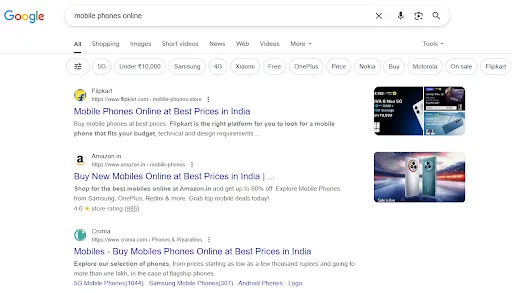
Flipkart also invests in paid search advertising on search engines like Google and Bing. This makes the e-commerce website appear in search results when users are looking for products.
- Charlotte Stone
Charlotte Stone is one of the famous footwear brands in California that makes one-of-a-kind products for women. They used to publish blogs by offering matching outfit ideas while showcasing products. Sharing stories of their followers is one of its strategies to create an attractive UGC.
- Amazon India

Amazon India employs a strategy that engages customers through their personal stories and product reviews. These positive experiences and detailed reviews enhance Amazon’s reliability as a platform. This effective content marketing approach enables consumers to make informed purchasing decisions.
- Boden
London-based clothing brand Boden revolutionized the way of social media content marketing. With an active presence on platforms like Facebook, X, and Instagram, Boden regularly posts engaging images and videos.
The clothing brand also shares its live videos, which creates user engagement. It also partners with fashion influencers for brand promotion.
- Boll & Branch
Luxury bedding brand Boll & Branch has implemented an effective e-commerce content marketing strategy to attract users by using a mix of how-to articles and tips blogs that provide value.
The brand uses custom charts with an educational approach to inform about some common myths in thread counts.
- Beardbrand
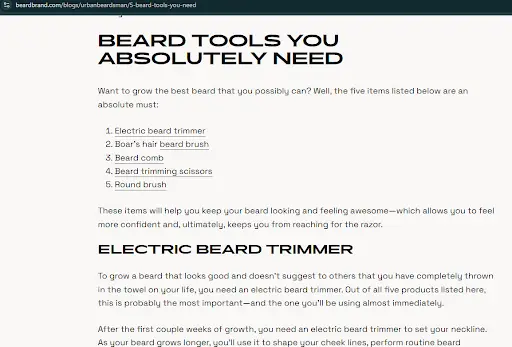
Beardbrand effectively promotes its website and products through strong content marketing strategies. The brand offers valuable information on growing moustaches and beards through its blog posts and YouTube videos.
By publishing detailed articles and videos, Beardbrand significantly increases its website traffic. One example is a comprehensive 1500-word article that provides essential tips on the beard tools you need to grow facial hair.
- Meesho
Meesho uses its content marketing strategy to raise social awareness on different aspects. For instance, it primarily focuses on empowering women to control their lives and make choices.
The Indian e-commerce brand uses social media ads and blogs to empower women, particularly those without financial independence.
- Asphalt Kingdom
The e-commerce content marketing strategies of Asphalt Kingdom primarily focus on how-to type content. It provides comprehensive information on repairs and maintenance through its blogs and articles.
The content of Asphalt Kingdom answers common questions of individuals with relevant infographics to make it more visual.
Takeaway
Content marketing is a top priority for e-commerce brands. Important e-commerce content marketing strategies include identifying relevant topics and target audiences, providing valuable information, and raising social awareness. Implementing these techniques can enhance your website’s performance and increase sales.
If you are looking to collaborate with skilled professionals and find cost-effective solutions, consider hiring leading content marketing agencies in India.
Frequently Asked Questions on E-Commerce Content Marketing Strategies
The four types of content marketing strategy are attraction, affinity, authority, and action. You must choose each type, asking yourself ‘Who are the target audiences’ and ‘What am I trying to inform’.
The four Cs of content marketing are cost, consumer, communication, and convenience.
The 7Ps of marketing mix are price, place, promotion, product, physical evidence, people, and process.

Rohit Majumdar, a professional SEO content writer with a specialisation in Digital Marketing and Finance, is working at Das Writing Services. In his SEO content writing career, he has worked for different clients offering products and services like insurance, FDs, brokerage, and digital marketing. Following his passion, he also contributes to our blog, exchanging valuable ideas. You can also contact him on LinkedIn for any queries.
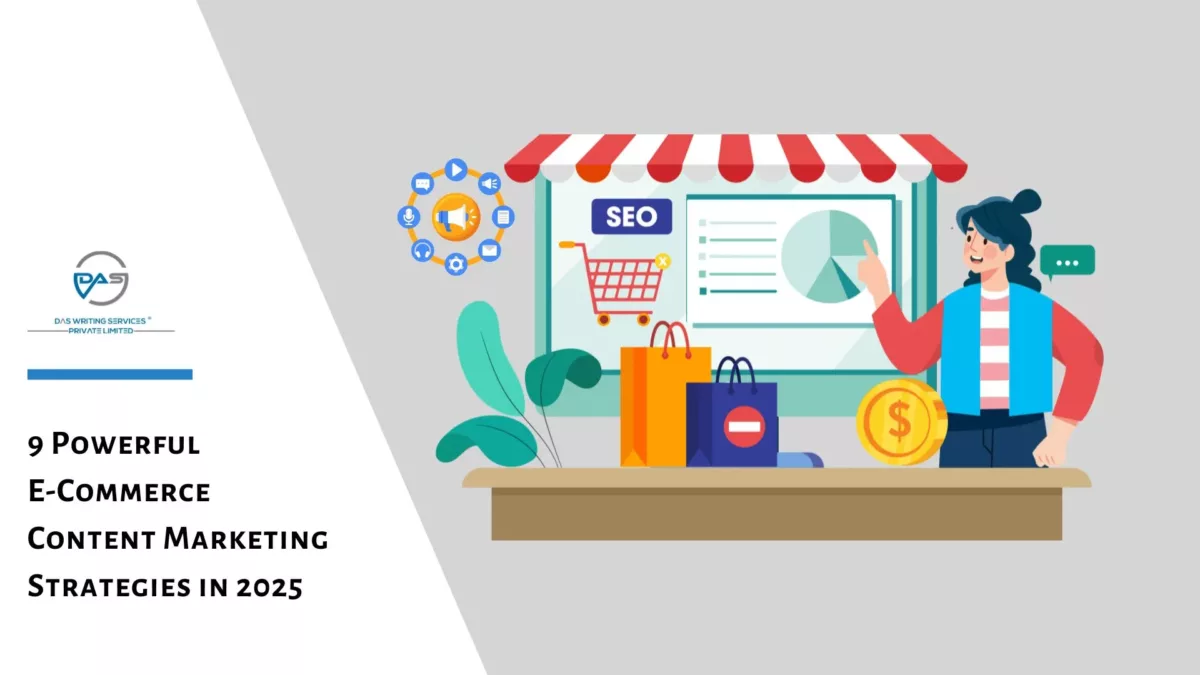




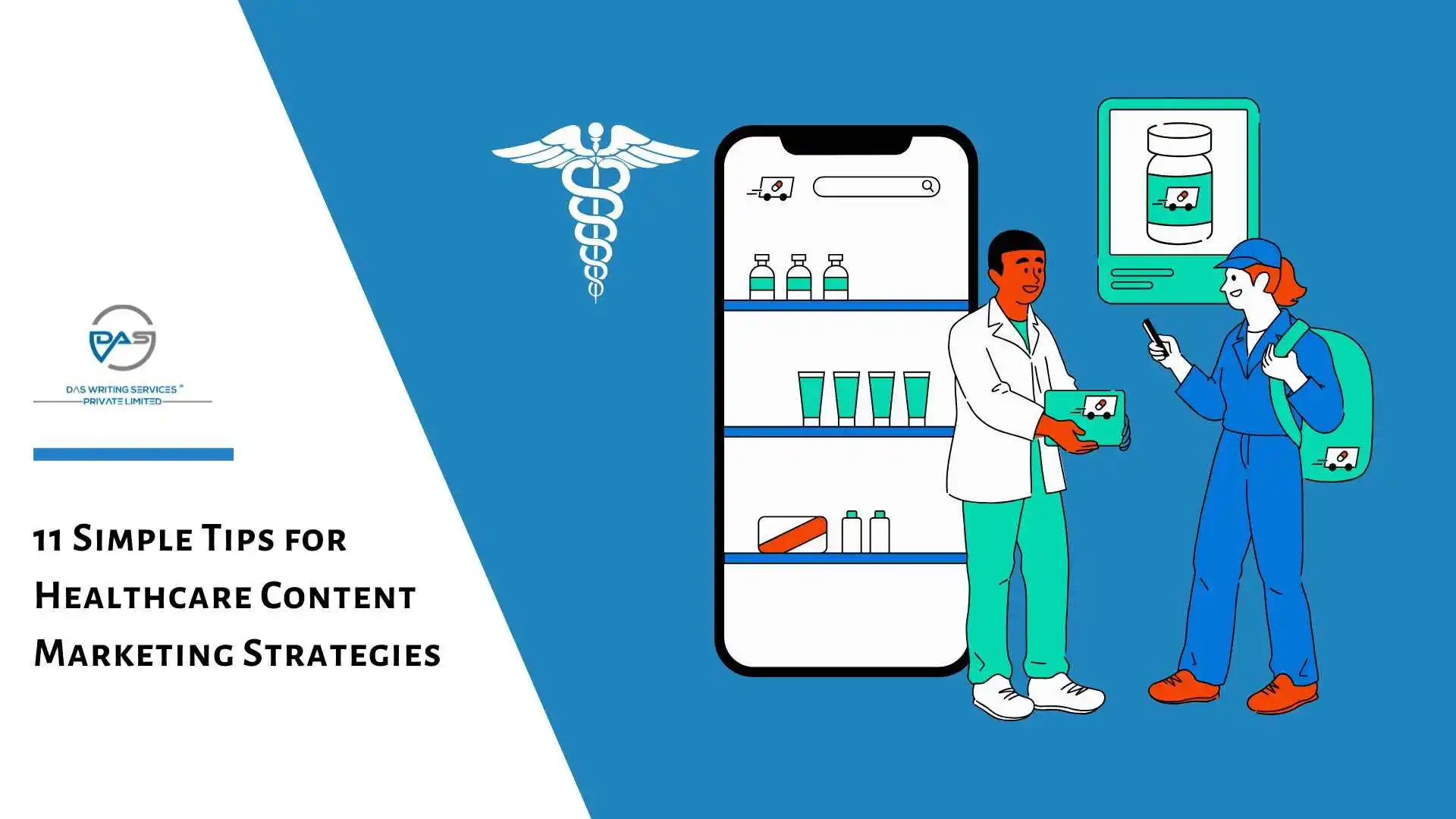
Leave a comment